

15-411 Compiler Design Fall 2014 / Frank Pfenning 1 15-411/611 Compiler Design Fall 2014
Teaching Staff Instructor Frank Pfenning, GHC 7019 Office hour: Thu 10:30-12:00 Teaching Assistants (GHC 5205 for now) Flávio Cruz, Thu 1:30-3:30 (starting Sep 10) Max Serrano, Wed 4:00-6:15 Rokhini Prabhu, Mon 6:00-8:00 Tae Gyun Kim, Tue 4:30-6:30 Updates on Piazza 2 15-411/611 Compiler Design Fall 2014
Course Communication Lectures: Tue & Thu, 9:00-10:20, WeH 7500 Recitations: none Piazza (including partner search) You will be enrolled with your Andrew ID Autolab You will be enrolled with your Andrew ID Hand-in for labs Maintains course grades http://www.cs.cmu.edu/~fp/courses/15411-f14 3 15-411/611 Compiler Design Fall 2014
Learning Goals: Compilers Compilers: from program text to machine code The structure of compilers Applied algorithms and data structures Context-free grammars and parsing Static single assignment form Data flow analysis Chordal graph coloring Focus on sequential imperative programming language Not functional, parallel, distributed, object-oriented, … Focus on code generation and optimization Not error messages, type inference, runtime system, … 4 15-411/611 Compiler Design Fall 2014
Learning Goals: Software Engineering A compiler is a substantial piece of software Building, testing, debugging, evolving Solo, or in a team of two Understanding high-level specifications Satisfying performance constraints Making and revising design decisions Implementation language Data representation Algorithms Modules and interfaces 5 15-411/611 Compiler Design Fall 2014
Role in the Curriculum 15-213 Introduction to Computer Systems Prerequisite 15-411 Compiler Design How are your high-level programs translated to low level? 15-410 Operating System Design and Implementation How is the execution of your programs managed? 15-441 Computer Networks How do programs communicate? 410, 411, 441 all satisfy system requirement 15-417 HOT Compilation How to compile higher-order typed languages 6 15-411/611 Compiler Design Fall 2014
Course Materials Extensive lecture notes Usually out a few days after lecture Textbook (optional) Andrew Appel, Modern Compiler Implementation in ML Lab specifications Details of language fragments you implement 7 15-411/611 Compiler Design Fall 2014
Your Responsibilities Lectures Lecture notes and readings only supplement lecture 5 written homeworks (30% of grade) Done individually 6 labs Done individually or in pairs Labs 1-4 (40% of grade) Write complete compilers and tests for increasingly complex languages Lab 5-6: (30% of grade) Extend in a direction that interests you; submit two papers No midterm exam, no final exam Academic integrity policy applies 8 15-411/611 Compiler Design Fall 2014
Homeworks Prepares you for lab 5 homeworks, about one week each Must be your own work 30% of final grade Due at beginning of lecture Up to two homeworks can be late, max of 2 days 9 15-411/611 Compiler Design Fall 2014
Labs – Overview Submitted through Autolab Week 1: test cases (validated against reference compiler) Week 2: compilers (checked against all test cases) Must be entirely your team’s work Acknowledge sources in readme.txt Can also be done individually, but less fun Autograded Against everyone’s test cases From this year and last year and … Reserve the right to inspect code Usually, feedback on code only if requested 10 15-411/611 Compiler Design Fall 2014
Labs – Language(s) to Compile C0, a small safe subset of C Designed by me and collaborators for teaching imperative programming at the freshman level (15-122) Small Safe Fully specified Augmented by a layer of contracts Rich enough to be representative and interesting Small enough to manage in a semester Use student compiler from 15-411 in 15-122 (some day) Or at least the code generator 11 15-411/611 Compiler Design Fall 2014
Labs – Language(s) to Target x86_64 architecture Widely used Quirky, but you can choose the instructions you use Low level enough you can “taste” the hardware Runtime system C0 uses the ABI (Application Binary Interface) for C Strict adherence (internally, and for library functions) Similar to x86, different from ARM May retarget your compiler in Lab 6 LLVM (Low Level Virtual Machine) ARM ? 12 15-411/611 Compiler Design Fall 2014
Labs – Cumulative Compiler Cumulatively build a compiler for C0 Expressions 1. Control flow 2. Functions 3. Structs and arrays 4. Optimizations (code + paper) 5. Each one is a complete, end-to-end compiler Lab 6 open-ended, submit code + term paper Retarget compiler Garbage collector Choose your own adventure 13 15-411/611 Compiler Design Fall 2014
Labs – Implementation Language Choose your own implementation language Starter code for Lab 1 in SML Haskell Scala (no longer supported) Java O’Caml C++?? 14 15-411/611 Compiler Design Fall 2014
Labs – Submission SVN repositories set up for each group ‘svn update’ For starter code in Lab 1 For lab specification For test cases For runtime system and grading script ‘svn commit’ Ask to be checked out and graded in Autolab Late days 6 total for semester At most 2 per lab Don’t fall behind! 15 15-411/611 Compiler Design Fall 2014
Labs – Partners Use Piazza to choose partners (if needed) Each one is responsible for all code Swap roles between labs Both must pull their weight Should decide by week 2 Contact instructor if you have problems 16 15-411/611 Compiler Design Fall 2014
Labs – Advice Labs are difficult and take time Plan ahead! Set up meetings with lab partners Talk to us and others about design decisions Don’t start the compiler only after the tests Errors in lab carry over to next lab Compilers are complex artifacts That’s one thing that makes them fun Hone your software engineering skills Submit early and often 17 15-411/611 Compiler Design Fall 2014
Recommend
More recommend